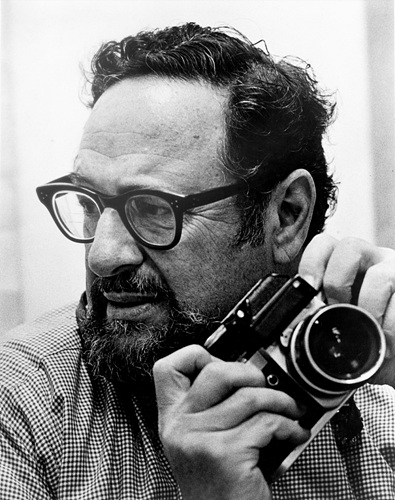<Back to Index>
- Mathematician Georg Ferdinand Ludwig Phillip Cantor, 1845
- Photographer Arnold Abner Newman, 1918
- First President of the Swiss Confederation Jonas Furrer, 1805

Arnold Abner Newman (3 March 1918, New York, NY — 6 June 2006, New York, NY) was an American photographer, noted for his "environmental portraits" of artists and politicians. He was also known for his carefully composed abstract still life images.
Newman graduated high school in Miami Beach and attended the University of Miami studying painting and drawing with an introduction to Modernism. Unable to afford continuing after two years, he moved to Philadelphia, PA to
work for a studio making 49-cent portraits. His time there taught the
importance of interacting with his subjects and allowed him to develop
his technique. Newman returned to Florida in 1942 to manage a portrait studio in West Palm Beach.
Three years later he opened his own business in Miami Beach. In 1946,
Newman relocated to New York, opened Arnold Newman Studios and worked
as a freelance photographer for Fortune, Life, and Newsweek. Newman found his vision in the empathy he felt for artists and their work. Although he photographed many personalities — Marlene Dietrich, John F. Kennedy, Harry S. Truman, Piet Mondrian, Pablo Picasso, Arthur Miller, Marilyn Monroe, Ronald Reagan, Mickey Mantle,
and Audrey Hepburn he maintained that even if the subject is not known,
or is already forgotten, the photograph itself must still excite and
interest the viewer. Newman is often credited with being the first photographer to use so-called environmental portraiture,
in which the photographer places the subject in a carefully controlled
setting to capture the essence of the individual's life and work.
Newman normally captured his subjects in their most familiar
surroundings with representative visual elements showing their
professions and personalities. A musician for instance might be
photographed in their recording studio or on stage, a Senator or other
politician in their office or a representative building. Using a
large-format camera and tripod, he worked to record every detail of a
scene. "I
didn't just want to make a photograph with some things in the
background," Newman told American Photo magazine in an interview. "The
surroundings had to add to the composition and the understanding of the
person. No matter who the subject was, it had to be an interesting
photograph. Just to simply do a portrait of a famous person doesn't
mean a thing." Newman's best-known images were in black and white, although he often photographed in color. His black and white portrait of Igor Stravinsky seated
at a grand piano became his signature image, even though it was
rejected by the magazine that gave the assignment to Newman. He was one
of the few photographers allowed to make a portrait of the famously
camera-shy Henri Cartier-Bresson. Among Newman's best-known color images is an eerie portrait that shows convicted former Nazi slave labor boss Alfried Krupp in one of Krupp's factories. Newman taught photography at Cooper Union for many years. He was recovering from a stroke when he died at Mt. Sinai Medical Center, New York.